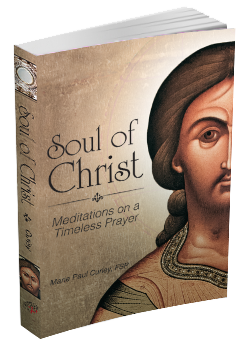 When I heard Sr. Marie-Paul was coming out with a book on the medieval Christian prayer, Anima Christi, I was excited.
When I heard Sr. Marie-Paul was coming out with a book on the medieval Christian prayer, Anima Christi, I was excited.
(If you need a refresher on what this prayer is, take a moment and pray it with me…)
The book, The Soul of Christ: Meditations on a Timeless Prayer is an introduction to Eucharistic prayer, particularly Pauline prayer, as well as an introduction to the history of the Anima Christi prayer. Sr. Marie-Paul reflects on the prayer phrase by phrase. The book also includes twelve hours of adoration that can be prayed individually or as a group.
Respected author and retreat director, Father Timothy Gallagher, OMV, said of the book:
“This is a lovely book, rich in content and warm in tone. The author’s unhurried contemplation, phrase by phrase, of this classic prayer, the Soul of Christ, revealed to me new depths in it and will change the way I pray it.”
Without further ado, I will share with you a short interview I did with Sr. Marie-Paul:
1. Of all the prayers that you could have chosen, why did you choose to write about the Anima Christi prayer?
I’ve loved the Anima Christi prayer for a long time–I actually don’t remember being introduced to it! Since I entered the convent, I’ve prayed it every day–we were invited to pray it at the end of meditation every morning.
For me, the Anima Christi prayer is an “easy in” to a profound spirit of prayer because of its direct address to Jesus, its warmth and familiarity with Jesus. When I pray the intimate words of the prayer (“Soul of Christ”) the words are so trusting that it helps me approach Jesus with loving confidence. Another thing I love about this prayer is that it helps me focus not just on what I want, but on what Jesus wants for me–holiness, salvation, transformation in him.
The Soul of Christ prayer helps us to pray with the mystery of Jesus offering his life for us on the cross, his offering of his self for us at every Mass in a way that’s concrete, and touches us daily. It helps us to understand that the Eucharist is not just about this big event that’s “out there”—Redemption isn’t just something that happened 2000 years ago. Rather, at every Mass, at every visit we make with Jesus in the Blessed Sacrament, Jesus is inviting us to be saved, to experience His unconditional love, to know for sure that He “has our back,” that He is on our side, that He wants to save us now. We always need Jesus’s saving love and forgiveness. And we can find that saving love and forgiveness in the Eucharist.
2. Is there one story or anecdote that shows the power of the Eucharist in your life?
It’s so hard to choose one! So I’ll share a story right from the book:
A few years ago when I was making retreat, it really came home to me how much I’d let fear stifle me throughout my life. But I didn’t have the humility to simply accept my fear and offer it to Jesus. Instead, I fell into the trap of shame and became deeply discouraged. If I was so full of fear, how could Christ love me and continue to call me to be a sister who communicates His love?
In this despondent frame of mind, I participated in midday Mass. I don’t remember the readings—I’m not sure I even heard them. I do remember the rising desperation that tightened my chest throughout the Eucharistic Prayer. Then it was time for Communion. Since there were no Eucharistic ministers, Father indicated that he would like me to distribute Communion. Reluctantly and struggling internally, I went up to the altar. I received the Host in my hand and held Jesus. What difference will it make? was my first thought. My sinfulness and fear will block Christ’s grace.Jesus, Lamb of God, I adore You, I tried to pray.
But I am not worthy to receive You! How can You even tolerate coming to me in Communion?
As I lifted the Host closer, I could see how thin that Host was, how frail! A piece had broken off so that the Host was not perfectly round. It was even crumbly around the edges. Like me, I realized. Something shifted inside of me. If Jesus could transform such a humble thing as a broken wafer of bread into His Body, couldn’t He transform me?
Those few seconds brushed eternity. I received Jesus very humbly, accepting His love for me, frail and fearful as I am. I begged Him to transform me and to work through my weakness. Jesus’s frailty in the Eucharistic Host had helped me to receive His love for me—in and even through my weaknesses.
3. Some people try Eucharistic Adoration and don’t find it appealing, do you have any pointers for them?
It depends on why people don’t find Eucharistic adoration appealing. For some people, the silence is really hard. That can be for a number of reasons, but I hear two reasons repeatedly:
1) We simply don’t know what to do with the silence. In this case, it’s good to start slow. At first, just make a short visit–maybe 10-20 minutes of adoration. During that time, choose a hymn, a favorite prayer, or a Scripture passage to pray with and/or reflect on. You can also use a book like Soul of Christ to guide your time of adoration.
2) When we are silent for a time, all the negative stuff–thoughts, feelings, or experiences–that we carry within us come to the fore, and we’re not expecting that. It can make any time of silence difficult, including time of adoration. It can be really hard if we feel that we have to be “extra-holy” to come to adoration. But what better place to deal with the “tough stuff” of our lives than with our loving Lord? In the Eucharist, Jesus welcomes and loves us. Jesus knows us better than we know ourselves, and delights in us, no matter what we are struggling with. It’s true that Jesus is our Savior and will work in us and in our lives to help us to grow into better persons, to grow out of our sinfulness, but that is Jesus’ love at work in our lives.
If silence is truly troublesome for someone, in addition to visiting Jesus in the Eucharist, I’d encourage that person to find help to deal with what is troubling them interiorly–whether that’s talking things out with a friend, taking time to work through it, seeing a counselor, seeking out spiritual direction. But I also encourage everyone to bring whatever is troubling us to Jesus in the Most Holy Eucharist. Keep the time of adoration to a length that feels manageable. Even five minutes of adoration can transform our day. And use favorite prayers, Scripture readings to make the time of adoration a real encounter with Jesus.
6. And what would you say to Catholics who don’t feel God’s presence and are struggling in their faith?
Hang in there! And don’t count your spiritual progress or the strength of your faith on how you feel.
Sometimes we think that, if we’re good Catholics, or if we are good Americans, our life is supposed to be smooth and easy. But this is a deception of our society (and the devil). The truth is that life here on earth is a struggle. God didn’t create our world marked but sin, but now that it is, living in a society that challenges almost every aspect of our faith makes living a life of faith very challenging. Faith is not supposed to be “cozy.”
Feeling God’s absence for an extended period of time is a suffering that is deeply painful and deeply redemptive. If we can offer our sufferings–even when we feel full of doubt–then we are united with Jesus on the cross. And there is no greater intimacy with Jesus than that! This is a tremendously, heroic way to live.
Thank you Sr. Marie-Paul for taking the time to share with me about your beautiful book!
– – –
If you are interested in downloading excerpts from Sr. Marie-Paul’s new book, you can go to the webpage for the book. But if you are already convinced and need this book for the next time you pray, you can order it here.












